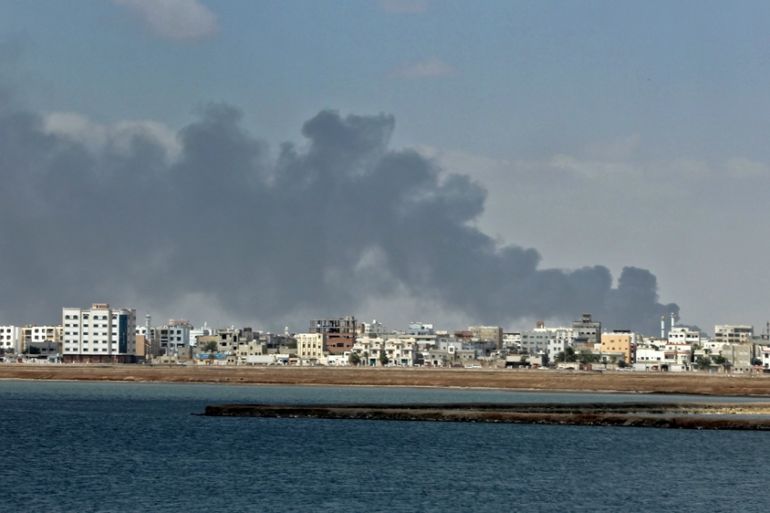UAE jet enables separatists to seize army base in Aden
Southern separatists gain control of the Fourth Brigade base in the coastal city after UAE jet bombed the facility.

A senior Yemeni official has told Al Jazeera that southern separatists, backed by the United Arab Emirates (UAE), seized control of a key military base in the coastal city of Aden, after a UAE fighter jet bombed the facility.
The official told Al Jazeera that fighters from the Southern Resistance Forces (SRF), the armed wing of the Southern Transitional Council (STC) – a political movement demanding secession for southern Yemen – seized the base early on Tuesday, despite a ceasefire being brokered by coalition partners Saudi Arabia and the UAE, hours earlier.
In a post on Twitter, Mukhtar al-Rahbi, an official in Yemen’s government, said: “A plane from the Arab coalition, that said it had come to support legitimacy [Yemen’s internationally recognised government] bombed the base of the Fourth Brigade. What a farce.”
Videos posted on social media showed thick plumes of black smoke billowing from the camp, which is located in Aden’s northern Dar Saad district.
الاسلحة الذي قصفها طيران التحالف داخل معسكر اللواء الرابع حماية رئاسية هي اسلحة من التحالف
التحالف مرتبك ولايوجد لديه رؤية واضحة
الحرب في اليمن تحولت الى حرب عبثية
لم يستهدف التحالف قيادي حوثي واحد من ثلاث سنواتمتى يفهم بائعي الوهم؟؟ pic.twitter.com/EsF1w4261k
— عباس الضالعي (@abbasaldhaleai) January 30, 2018
The seizure of the Fourth Brigade is the biggest gain for the separatists since fighting first erupted on Sunday.
A source in the city told Al Jazeera that the SRF had now gained control of most of Aden and fought their way to the gates of Al-Mashaiq Palace where Yemen’s government resides.
The source said that Prime Minister Ahmed bin Daghr and several ministers remained inside the building and that the separatists had not seized the palace itself.
‘Refrain from further bloodshed’
Fighting in Aden first erupted on Sunday, when the STC ordered President Abd-Rabbu Mansour Hadi to dismiss his prime minister and cabinet or face an overthrow.
The group accused Bin Daghr’s Aden-based government of “rampant corruption” resulting in a “deteriorating economic, security and social situation never before witnessed in the history of the south”.
Hadi, who has been living in Saudi Arabia for most of the war, rejected the ultimatum, describing the separatists’ actions as a “coup“.
The violence has killed at least 36 people and wounded 185 since Sunday, according to the International Committee of the Red Cross.
The US State Department pressed for an end to the fighting late on Monday, calling on all parties to “refrain from escalation and further bloodshed.”
“We also call for dialogue among all parties in Aden to reach a political solution,” the statement said. “The Yemeni people are already facing a dire humanitarian crisis. Additional divisions and violence within Yemen will only increase their suffering.”
Deep divisions
Events in Aden have exposed deep divisions between Hadi’s government and the Saudi-UAE coalition.
The UAE entered Yemen’s war in March 2015 as part of a Saudi-led coalition seeking to roll back advances made by Houthi rebels after they overran much of the country, including the capital Sanaa, in 2014.
Nearly three years on, the coalition has failed to achieve its stated aim of restoring the “legitimate” government of Hadi.
Saudi Arabia has said it “wants out” of the costly exercise, but the UAE has become more involved in the conflict, indicating a divide in the two countries’ agendas.
The UAE has financed and trained armed groups in the south who answer to it, and set up prisons and created a security establishment parallel to Hadi’s government, according to Human Rights Watch.
Hashem Ahelbarra, an Al Jazeera correspondent who has reported extensively from the country, said the latest developments were a “game changer” for the coalition, “but for more than one reason”.
“When the coalition launched its war in 2015 they said it was aimed at preserving a united Yemen, this is no longer the case. The secessionists could say tomorrow that they would like to start procedures for an independent south Yemen. If this happens you will have two Yemens.
“This raises questions about whether the UAE and Saudi Arabia are on the same page regarding the country’s future,” Ahelbarra said.
“The Houthis are consolidating their grip in the north and so are the secessionists in the south. Meanwhile, Hadi has lost complete control over territories he controlled and this could pave the way for warlords, tribes, and armed groups such as the local affiliates of ISIL and al-Qaeda to expand their presence in the country,” he added.